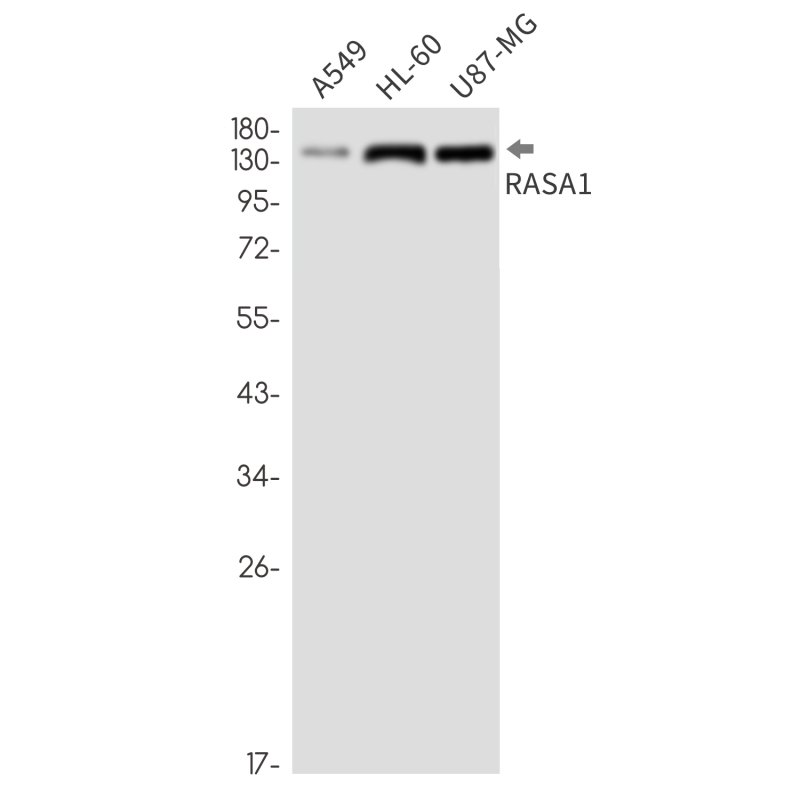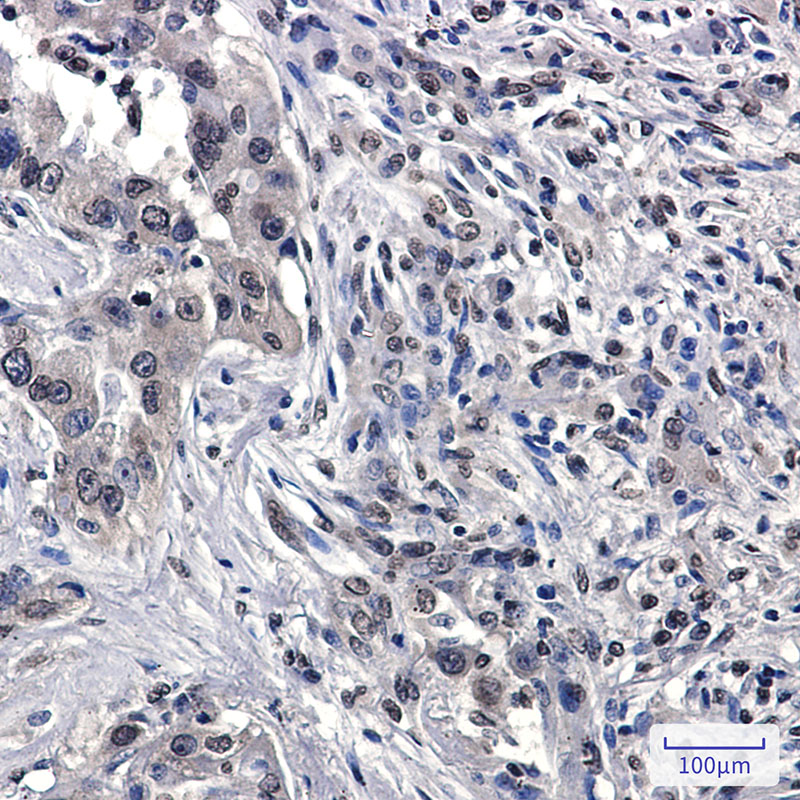

| WB | 1/500-1/1000 | Human,Mouse,Rat |
| IF | 咨询技术 | Human,Mouse,Rat |
| IHC | 1/50-1/100 | Human,Mouse,Rat |
| ICC | 技术咨询 | Human,Mouse,Rat |
| FCM | 咨询技术 | Human,Mouse,Rat |
| Elisa | 咨询技术 | Human,Mouse,Rat |
| Aliases | GAP; PKWS; RASA; p120; CMAVM; CM-AVM; CMAVM1; RASGAP; p120GAP; p120RASGAP |
| Entrez GeneID | 5921 |
| WB Predicted band size | Calculated MW: 116 kDa; Observed MW: 140 kDa |
| Host/Isotype | Rabbit IgG |
| Antibody Type | Primary antibody |
| Storage | Store at 4°C short term. Aliquot and store at -20°C long term. Avoid freeze/thaw cycles. |
| Species Reactivity | Human |
| Immunogen | A synthetic peptide of human RASA1 |
| Formulation | Purified antibody in TBS with 0.05% sodium azide,0.05%BSA and 50% glycerol. |
+ +
以下是3篇涉及RASA1抗体应用的文献概览:
---
1. **文献名称**:*"RASA1 regulates the function of lymphatic vessel valves in mice"*
**作者**:Lapinski PE et al.
**摘要**:研究利用RASA1特异性抗体进行免疫组化,发现RASA1缺失导致小鼠淋巴管瓣膜功能异常,揭示了其在淋巴系统发育中的关键作用。
---
2. **文献名称**:*"Germline mutations in RASA1 are associated with Parkes Weber syndrome"*
**作者**:Eerola I et al.
**摘要**:通过Western blot和免疫荧光(使用RASA1抗体)分析患者样本,证实RASA1功能丧失突变与Parkes Weber综合征的血管畸形直接相关。
---
3. **文献名称**:*"p120-RasGAP mediates β-catenin stability in colorectal cancer"*
**作者**:Wang J et al.
**摘要**:采用RASA1抗体检测结直肠癌组织中p120-RasGAP蛋白表达,发现其低表达与β-catenin信号异常激活及患者预后不良相关。
---
以上文献均通过RASA1抗体进行蛋白定位或表达分析,支撑了其在血管疾病、遗传综合征及癌症中的机制研究。如需具体期刊信息或PMID,可进一步补充检索。
The RASA1 antibody targets the Ras GTPase-activating protein 1 (RASA1), a critical regulator of the Ras signaling pathway. RASA1. encoded by the RASA1 gene, functions as a negative modulator of Ras proteins by accelerating their GTP-to-GDP hydrolysis, thereby inactivating Ras-mediated signals that drive cell proliferation, differentiation, and survival. Dysregulation of RASA1 is linked to vascular malformations, such as capillary malformation-arteriovenous malformation (CM-AVM) syndrome, and has been implicated in certain cancers due to its tumor-suppressive role.
RASA1 antibodies are widely used in research to study protein expression, localization, and functional interactions in cellular and disease contexts. They enable detection of RASA1 via techniques like Western blotting, immunohistochemistry, and immunofluorescence, aiding in the exploration of its role in vascular development, tumorigenesis, and signal transduction. Mutations in RASA1 often lead to truncated or non-functional proteins, which these antibodies can help identify in clinical or experimental settings.
Additionally, RASA1 antibodies contribute to therapeutic research, particularly in understanding how disrupted Ras/MAPK pathway regulation influences disease mechanisms. Their application in preclinical models, such as endothelial cell studies or genetically engineered mice, provides insights into potential targeted therapies for RASA1-related disorders. Overall, RASA1 antibodies serve as essential tools for unraveling the protein's biological significance and its implications in human health.
×